The Dutch Jazz Orchestra - Something To Live For: The Music of Billy Strayhorn (2007) FLAC
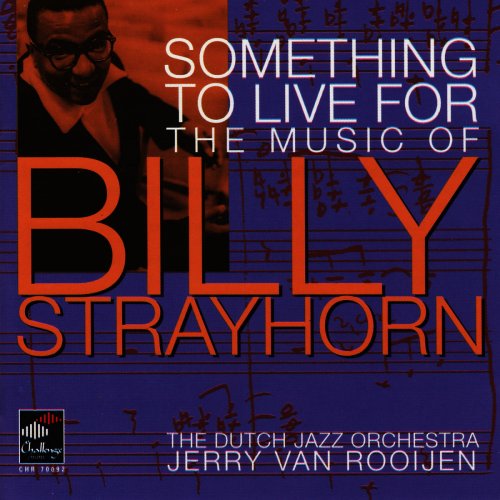
Artist: The Dutch Jazz Orchestra
Title: Something To Live For: The Music of Billy Strayhorn
Year Of Release: 2007
Label: Challenge Records
Genre: Jazz
Quality: FLAC (tracks)
Total Time: 51:31 min
Total Size: 301 MB
WebSite: Album Preview
Title: Something To Live For: The Music of Billy Strayhorn
Year Of Release: 2007
Label: Challenge Records
Genre: Jazz
Quality: FLAC (tracks)
Total Time: 51:31 min
Total Size: 301 MB
WebSite: Album Preview
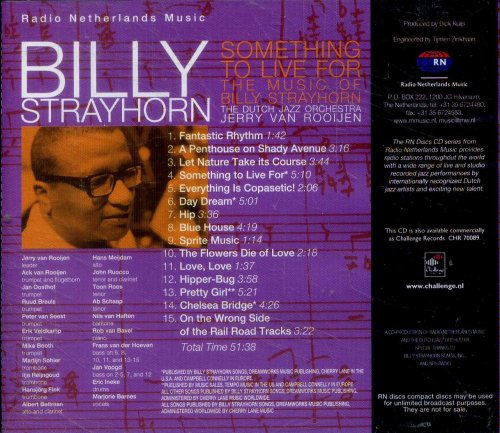
Tracklist:
01. Fantastic Rhythm
02. A Penthouse on Shady Avenue
03. Let Nature Take its Course
04. Something to Live For
05. Everything Is Copasetic!
06. Day Dream
07. Hip
08. Blue House
09. Sprite Music
10. The Flowers Die of Love
11. Love, Love
12. Hipper-Bug
13. Pretty Girl
14. Chelsea Bridge
15. On the Wrong Side of the Rail Road Tracks
The fourth in the Dutch Jazz Orchestra’s series of albums devoted to songs composed and/or arranged by Billy Strayhorn focuses primarily on music written by Strayhorn for the theatre, beginning with the few surviving pieces from the concise show Fantastic Rhythm, produced around 1935, shortly after Strayhorn was graduated from high school. Also included are four songs written in 1953 for a surrealist play by Federico García Lorca, The Love of Don Perlimplim for Belisa in Their Garden, three of which — “Sprite Music,” “Love, Love,” “The Flowers Die of Love” - - were previously unrecorded. The fourth, “Wounded Love,” was introduced by the DJO on the first album in this series, Portrait of a Silk Thread.
Strayhorn wrote “Everything Is Copasetic!” [sic] in 1962 for one of the annual shows presented by the Copasetics, a group of professional tap-dancers that he supervised, and “Wrong Side of the Railroad Tracks” for another show, Beggar’s Holiday. The other pieces, all of which were written for the Duke Ellington Orchestra, include the well-known “Chelsea Bridge” and “Pretty Girl,” presented in their unabridged form, the restful “Day Dream,” and world premieres of “Hipper-Bug,” “Blue House,” “Hip” and the 1942 arrangement of “Something to Live For,” featuring tenor saxophonist Toon Roos.
As on the other albums in the series, the DJO is letter-perfect, transcribing Strayhorn’s music with remarkable empathy and awareness. Soloists are excellent, with pianist Rob van Bavel showcased on “Fantastic Rhythm” and “Sprite Music” (both unaccompanied), clarinetist John Ruocco on “Everything Is Copasetic!,” trumpeter Mike Booth on “Hip,” alto saxophonist Albert Beltman on “Pretty Girl.” Roos is heard again with trombonist Martijn Sohier on “Blue House,” flugel Ack van Rooyen on “Hipper-Bug,” trombonist Hansjörg Fink and baritone Nils van Haften on “Chelsea Bridge.” There are half a dozen vocals by marvelous Marjorie Barnes, the best singer I’ve heard with any band in recent memory, and she’s outstanding on every one of them.
Fans of good music in general and jazz in particular are indebted to musicologist and Strayhorn scholar Walter van de Leur for painstakingly canvassing the composer’s voluminous library to uncover so many wonderful treasures—and to the Dutch Jazz Orchestra and conductor Jerry van Rooyen for making them available in such handsomely recorded new versions.
Strayhorn wrote “Everything Is Copasetic!” [sic] in 1962 for one of the annual shows presented by the Copasetics, a group of professional tap-dancers that he supervised, and “Wrong Side of the Railroad Tracks” for another show, Beggar’s Holiday. The other pieces, all of which were written for the Duke Ellington Orchestra, include the well-known “Chelsea Bridge” and “Pretty Girl,” presented in their unabridged form, the restful “Day Dream,” and world premieres of “Hipper-Bug,” “Blue House,” “Hip” and the 1942 arrangement of “Something to Live For,” featuring tenor saxophonist Toon Roos.
As on the other albums in the series, the DJO is letter-perfect, transcribing Strayhorn’s music with remarkable empathy and awareness. Soloists are excellent, with pianist Rob van Bavel showcased on “Fantastic Rhythm” and “Sprite Music” (both unaccompanied), clarinetist John Ruocco on “Everything Is Copasetic!,” trumpeter Mike Booth on “Hip,” alto saxophonist Albert Beltman on “Pretty Girl.” Roos is heard again with trombonist Martijn Sohier on “Blue House,” flugel Ack van Rooyen on “Hipper-Bug,” trombonist Hansjörg Fink and baritone Nils van Haften on “Chelsea Bridge.” There are half a dozen vocals by marvelous Marjorie Barnes, the best singer I’ve heard with any band in recent memory, and she’s outstanding on every one of them.
Fans of good music in general and jazz in particular are indebted to musicologist and Strayhorn scholar Walter van de Leur for painstakingly canvassing the composer’s voluminous library to uncover so many wonderful treasures—and to the Dutch Jazz Orchestra and conductor Jerry van Rooyen for making them available in such handsomely recorded new versions.
![Ex Novo Ensemble - OSVALDO COLUCCINO: Emblema (2018) [Hi-Res] Ex Novo Ensemble - OSVALDO COLUCCINO: Emblema (2018) [Hi-Res]](https://img.israbox.com/img/2026-02/22/ot6pocjri3hisq06iz4768yl5.jpg)
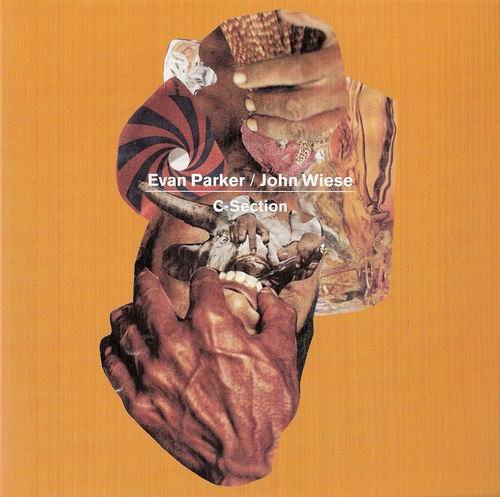
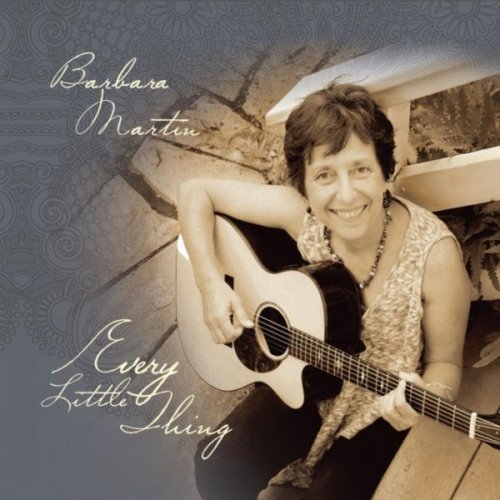
![Chris Forsyth's WHAT IS NOW - Both / And (2026) [Hi-Res] Chris Forsyth's WHAT IS NOW - Both / And (2026) [Hi-Res]](https://www.dibpic.com/uploads/posts/2026-02/1771839412_cover.jpg)
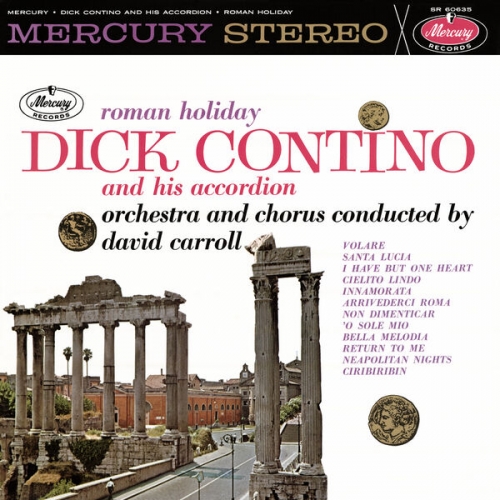
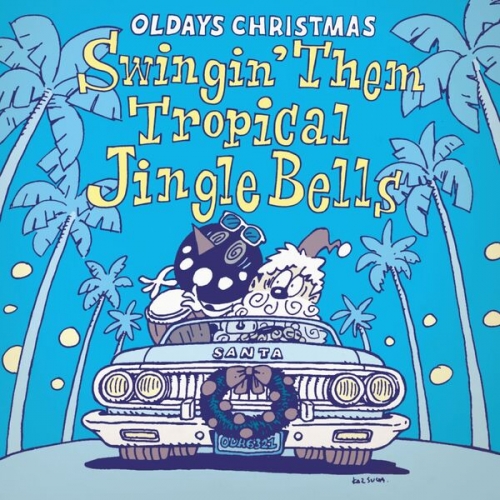
![Sinedades - De par en par (2026) [Hi-Res] Sinedades - De par en par (2026) [Hi-Res]](https://img.israbox.com/img/2026-02/23/k9xyrl2p7m3kmcwozolhfnu7a.jpg)
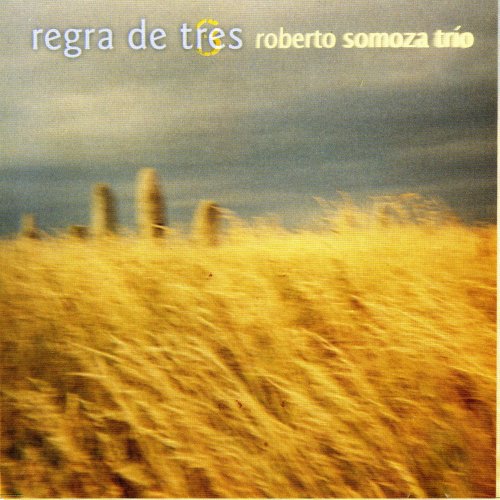
![Julian Lage - Scenes From Above (Japanese Edition Bonus Track) (2026) [SHM-CD] Julian Lage - Scenes From Above (Japanese Edition Bonus Track) (2026) [SHM-CD]](https://www.dibpic.com/uploads/posts/2026-02/1772029332_front.jpg)